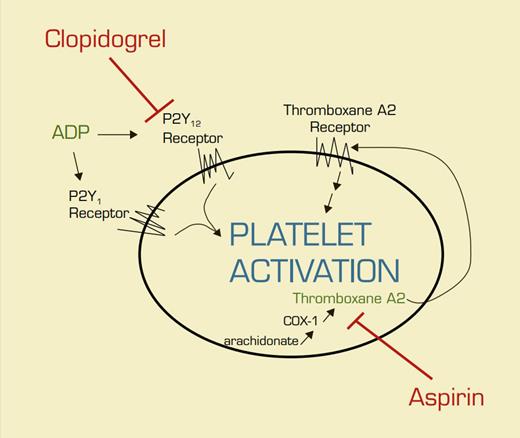The CHARISMA trial enrolled 15,603 patients with either documented cardiovascular disease or multiple atherothrombotic risk factors. Patients were randomized to receive low-dose aspirin along with either clopidogrel or placebo, and monitored for an average of 28 months. Although there was a trend toward benefit, the combined incidence of myocardial infarctions, strokes, and cardiovascular deaths was not statistically significant between patients treated with combined modality anti-platelet therapy and those treated with aspirin alone. Similarly, there was a trend toward a higher incidence of severe bleeding in the double treatment group, but again, this was not a statistically significant difference.
In Brief
Like ticlopidine, clopidogrel is a member of a class of compounds called thienopyridines. Metabolites of these drugs directly inhibit P2Y12, one of two types of ADP receptors found on platelets. The CAPRIE study demonstrated that clopidogrel was at least as good as aspirin in preventing cerebrovascular and cardiovascular events in 19,185 patients with known atherosclerosis1 . Since aspirin and clopidogrel poison platelets by different mechanisms (Figure 1), it is suggested that these agents might have additive effects. In theory, this could be beneficial in the treatment of diseases associated with platelet activation such as ischemic heart disease, peripheral vascular disease, and ischemic strokes. This theory was tested in the CURE trial that analyzed the outcome of 12,562 patients with the acute coronary syndrome2 . In this study, the addition of clopidogrel to aspirin decreased the combined incidence of cardiovascular deaths, myocardial infarctions, and strokes from 11.4 percent to 9.3 percent. The benefit of double therapy was partially offset by an increase in severe bleeding from 2.7 percent to 3.7 percent.
The findings of the CURE trial spawned a new series of trials investigating whether double platelet blockade was better than single anti-platelet therapy in a variety of patients at risk for arterial thrombi. Additional studies of patients who had myocardial infarctions or angioplasty demonstrated and appeared to confirm a benefit to double platelet blockade that outweighed the associated bleeding risk. However, in the MATCH study, the bleeding complications of patients who received dual anti-platelet therapy for the prevention of strokes offset any benefit3 .
The trial published by Bhatt and colleagues was designed to determine whether long-term treatment with both clopidogrel and aspirin was better than aspirin alone in a broad population at risk for cardiovascular events. As found in the other trials, any benefit for double anti-platelet therapy was at best modest. In total, there were 94 less ischemic events in patients treated with both clopidogrel and aspirin, but at the expense of 93 more moderate or severe bleeding events. Except in special circumstances such as angioplasty, it appears that the added benefit of double anti-platelet therapy for most patients is small, and, at times, dangerous.
References
Competing Interests
Dr. Abrams indicated no relevant conflicts of interest.Bhatt DL, Fox KA, Hacke W, et al.; CHARISMA Investigators. Clopidogrel and aspirin versus aspirin alone for the prevention of atherothrombotic events. N Engl J Med 2006;354:1706-17.

